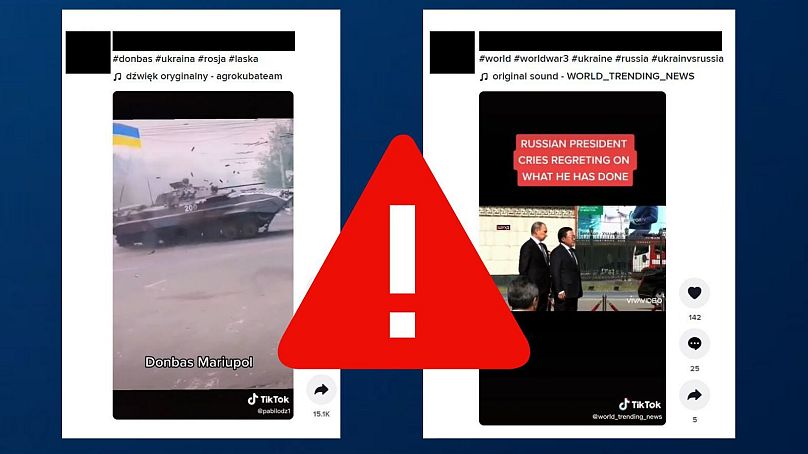By The Cube • Updated: 22/03/2022

TikTok suspended most of their services in Russia following a government crackdown on information about Russia's war in Ukraine. -
Copyright Kiichiro Sato/Copyright 2020 The Associated Press. All rights reserved
New TikTok users are exposed to misinformation about the war in Ukraine within 40 minutes of signing up, according to a new report.
The study, published by the fact-checking group NewsGuard, found that new users searching for information about the conflict, "led to TikTok suggesting multiple videos that contained disinformation in its top 20 results".
The experiment was conducted by six NewsGuard analysts in Switzerland, Germany, Italy, the UK and the US, who scrolled through the social media platform's 'For You' page and watched any Russia-Ukraine related videos in full.
"Toward the end of the 45–minute experiment, analysts’ feeds were almost exclusively populated with both accurate and false content related to the war in Ukraine — with no distinction made between disinformation and reliable sources," the report read.
One misleading video -- which has amassed over 3 million views on TikTok -- purportedly shows Ukrainian armed forces storming the streets of Mariupol.
The video was first posted in 2014 during a crisis involving pro-Russian separatists.

New TikTok users are exposed to misinformation about the war in Ukraine within 40 minutes of signing up, according to a new report.
The study, published by the fact-checking group NewsGuard, found that new users searching for information about the conflict, "led to TikTok suggesting multiple videos that contained disinformation in its top 20 results".
The experiment was conducted by six NewsGuard analysts in Switzerland, Germany, Italy, the UK and the US, who scrolled through the social media platform's 'For You' page and watched any Russia-Ukraine related videos in full.
"Toward the end of the 45–minute experiment, analysts’ feeds were almost exclusively populated with both accurate and false content related to the war in Ukraine — with no distinction made between disinformation and reliable sources," the report read.
One misleading video -- which has amassed over 3 million views on TikTok -- purportedly shows Ukrainian armed forces storming the streets of Mariupol.
The video was first posted in 2014 during a crisis involving pro-Russian separatists.

False videos misrepresenting the war in Ukraine continue to spread across TikTok
Euronews via TikTok
Other popular examples include videos of the so-called "Ghost of Kyiv", who was said to have single-handedly brought down six Russian planes at the beginning of the invasion.
This has since been debunked by fact-checkers, who revealed that the footage actually came from the videogame "Digital Combat Simulator (DCS) World".
NewsGuard also said that "some of the myths in the videos TikTok’s algorithm fed to analysts have previously been identified as Kremlin propaganda".
In response, TikTok said that the experiment did "not mimic standard viewing behaviour".
"While this experiment does not mimic standard viewing behaviour, we continue to respond to the war in Ukraine with increased safety and security resources as we work to remove harmful misinformation and help protect a safe experience on TikTok".
They added that the company partners with independent fact-checking organisations to ensure that TikTok remains a "safe and authentic place."
TikTok surpassed Facebook in 2021 to become the first non-Meta owned app to host more than one billion monthly users.
Chine Labbe, Managing Editor at NewsGuard, told Euronews that the age of Tiktok's users means the spread of misinformation is "very troubling".
"When you use TikTok, you scroll down and scroll down and see an endless stream of videos," Labbe said.
"Think about a teenager watching a video of Putin speaking without any context or misleading videos about the war ... this is very problematic," she added.
"We know a lot of young people rely only on TikTok for their information."
Other popular examples include videos of the so-called "Ghost of Kyiv", who was said to have single-handedly brought down six Russian planes at the beginning of the invasion.
This has since been debunked by fact-checkers, who revealed that the footage actually came from the videogame "Digital Combat Simulator (DCS) World".
NewsGuard also said that "some of the myths in the videos TikTok’s algorithm fed to analysts have previously been identified as Kremlin propaganda".
In response, TikTok said that the experiment did "not mimic standard viewing behaviour".
"While this experiment does not mimic standard viewing behaviour, we continue to respond to the war in Ukraine with increased safety and security resources as we work to remove harmful misinformation and help protect a safe experience on TikTok".
They added that the company partners with independent fact-checking organisations to ensure that TikTok remains a "safe and authentic place."
TikTok surpassed Facebook in 2021 to become the first non-Meta owned app to host more than one billion monthly users.
Chine Labbe, Managing Editor at NewsGuard, told Euronews that the age of Tiktok's users means the spread of misinformation is "very troubling".
"When you use TikTok, you scroll down and scroll down and see an endless stream of videos," Labbe said.
"Think about a teenager watching a video of Putin speaking without any context or misleading videos about the war ... this is very problematic," she added.
"We know a lot of young people rely only on TikTok for their information."
Naysayers, Rumours, Fake News Have Made Covid-19 Battle Tough: Virologist
Fake news, rumour campaigns and naysayers have had a huge impact on the battle against Covid-19 over the past two years, top virologist Dr Yong Poovorawan said in a Facebook post on Monday.

He said fake news was published and widely shared on social media, yet it was never corrected when the truth was revealed.
“Many people believe in such fake news if they consume it frequently, especially about Covid-19 and vaccines,” he said.
Yong added that rumour campaigns, which only carry about 20 per cent truth, generally cause traumatic stress among people, resulting in an impact on society and the economy. Also, he said, bullying from naysayers is very common in social media.
“Hence, media outlets should be honest and patient as the truth will eventually surface,” he said, adding that it was a pity people had lost opportunities to battle against the disease.
The virologist added that it was necessary to make children aware that they should not believe in news that has not been proven in line with cause and effect and scientific principles.
“They should be able to tell the difference between true and false, and should ensure that the news they share comes from reliable sources,” he said.
He added that people have learned to become patient and were striving to seek knowledge on the battle against a newly emergent disease over the past two years.
Published : March 13, 2022
By : THE NATION
Fake news, rumour campaigns and naysayers have had a huge impact on the battle against Covid-19 over the past two years, top virologist Dr Yong Poovorawan said in a Facebook post on Monday.

He said fake news was published and widely shared on social media, yet it was never corrected when the truth was revealed.
“Many people believe in such fake news if they consume it frequently, especially about Covid-19 and vaccines,” he said.
Yong added that rumour campaigns, which only carry about 20 per cent truth, generally cause traumatic stress among people, resulting in an impact on society and the economy. Also, he said, bullying from naysayers is very common in social media.
“Hence, media outlets should be honest and patient as the truth will eventually surface,” he said, adding that it was a pity people had lost opportunities to battle against the disease.
The virologist added that it was necessary to make children aware that they should not believe in news that has not been proven in line with cause and effect and scientific principles.
“They should be able to tell the difference between true and false, and should ensure that the news they share comes from reliable sources,” he said.
He added that people have learned to become patient and were striving to seek knowledge on the battle against a newly emergent disease over the past two years.
Published : March 13, 2022
By : THE NATION
No comments:
Post a Comment